外研版英语课件必修一Module 3 My First Ride on a Train知识点课件(35张ppt)
文档属性
| 名称 | 外研版英语课件必修一Module 3 My First Ride on a Train知识点课件(35张ppt) |

|
|
| 格式 | zip | ||
| 文件大小 | 448.2KB | ||
| 资源类型 | 教案 | ||
| 版本资源 | 外研版 | ||
| 科目 | 英语 | ||
| 更新时间 | 2019-11-14 22:01:31 | ||
图片预览


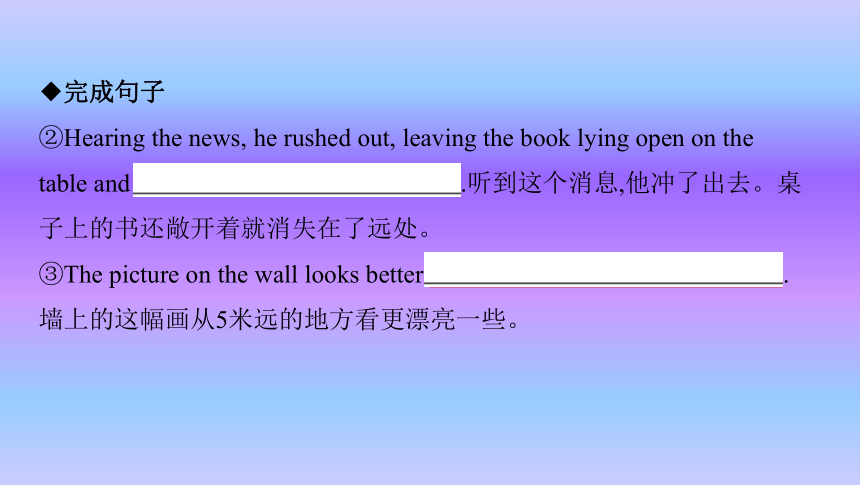
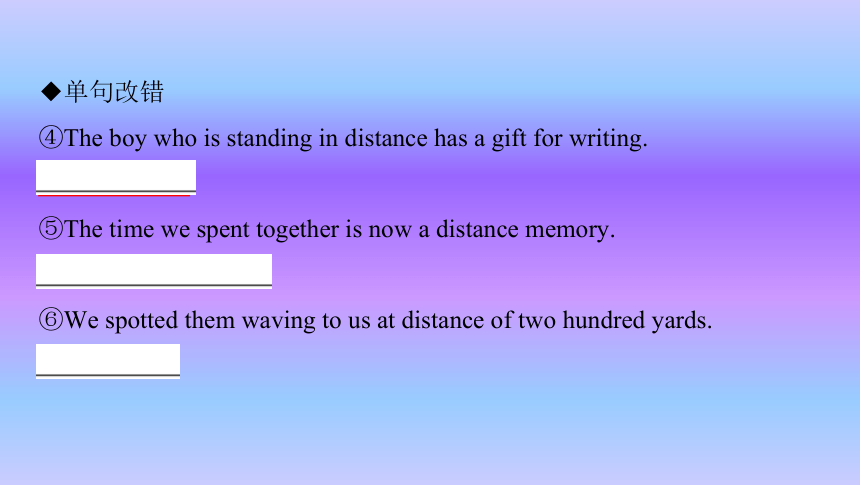
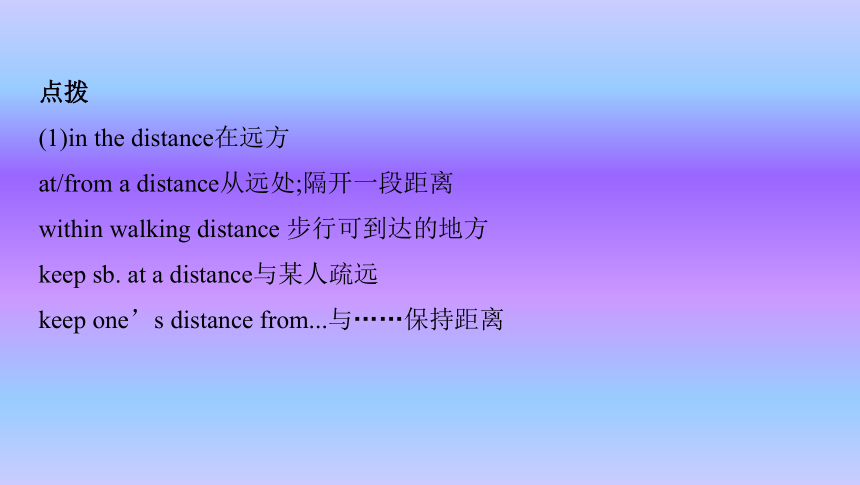

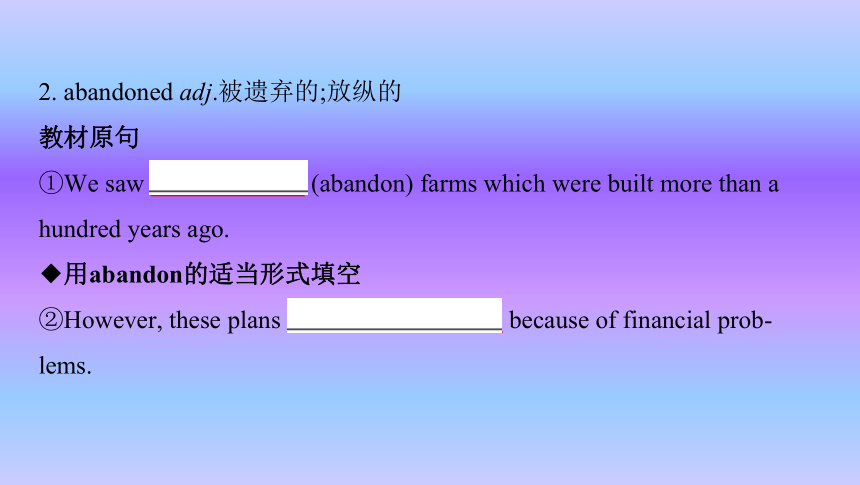
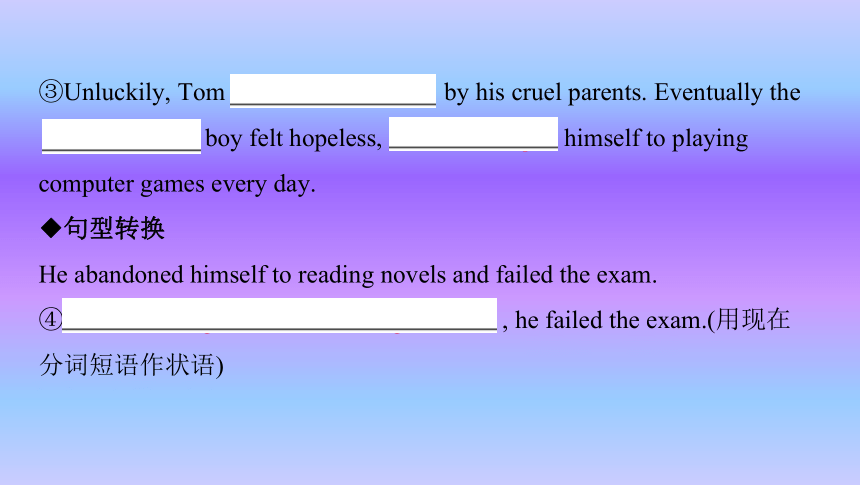

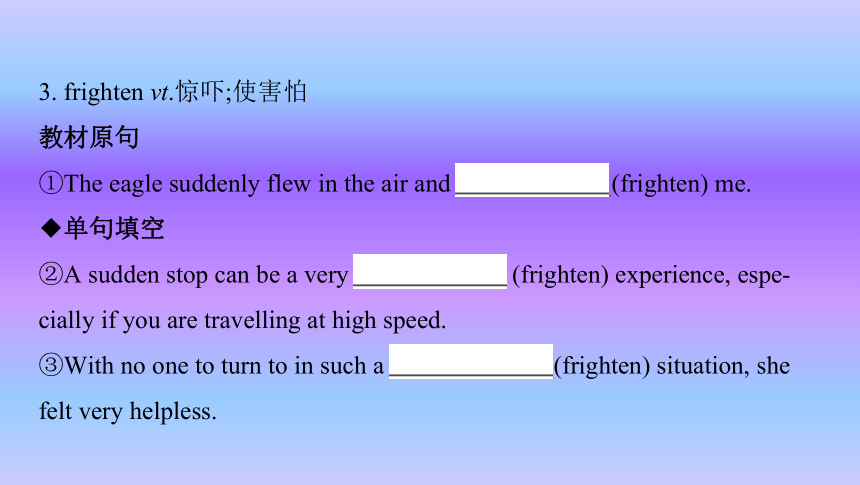
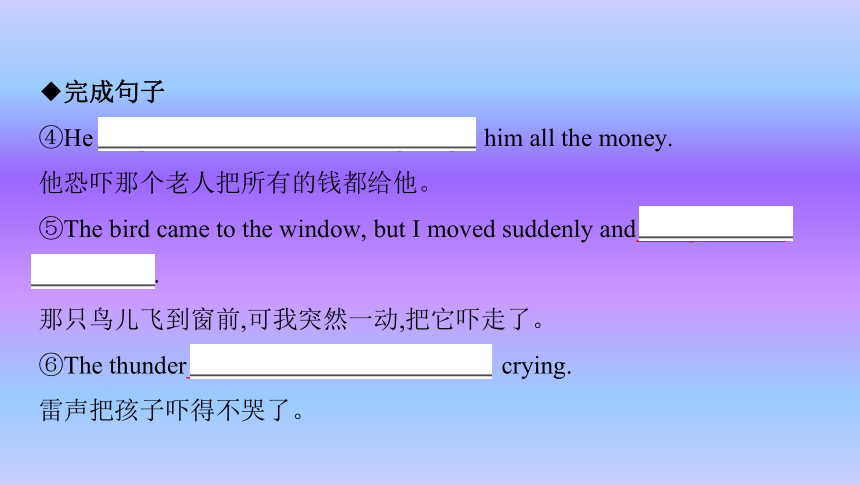
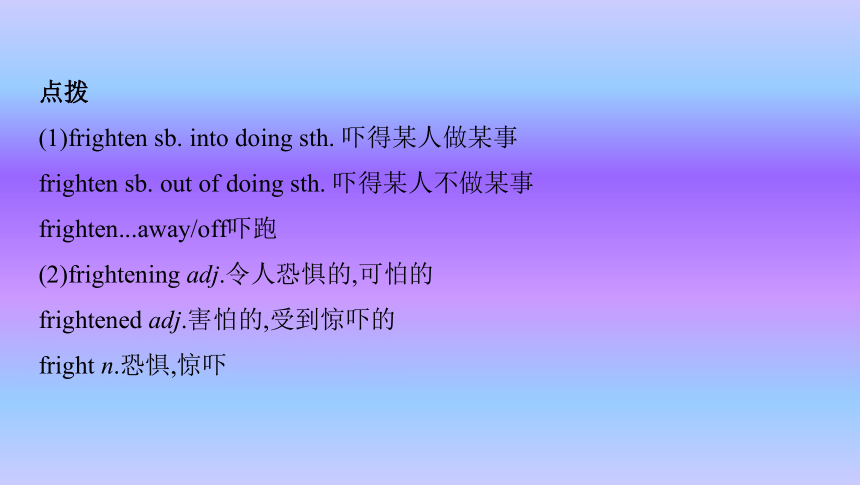
文档简介
课件35张PPT。
必修一 Module 3 My First Ride on a Train1. distance n.距离;远方;遥远;疏远 v.与……疏远
教材原句
①I first travelled ????a long distance????(长途旅行) by train when I was six years old. 重点单词◆完成句子
②Hearing the news, he rushed out, leaving the book lying open on the
table and disappeared in the distance????.听到这个消息,他冲了出去。桌 子上的书还敞开着就消失在了远处。
③The picture on the wall looks better from a distance of five meters????. 墙上的这幅画从5米远的地方看更漂亮一些。◆单句改错
④The boy who is standing in distance has a gift for writing.
in后加the????
⑤The time we spent together is now a distance memory.
distance→distant????
⑥We spotted them waving to us at distance of two hundred yards.
at后加a????点拨
(1)in the distance在远方
at/from a distance从远处;隔开一段距离
within walking distance 步行可到达的地方
keep sb. at a distance与某人疏远
keep one’s distance from...与……保持距离(2)distant adj.遥远的;远处的
a distant village一个遥远的村庄
a distant relative一个远房亲戚
【点津】对于distance的提问多用what,而不用how far。2. abandoned adj.被遗弃的;放纵的
教材原句
①We saw ????abandoned????(abandon) farms which were built more than a hundred years ago.
◆用abandon的适当形式填空
②However, these plans were abandoned???? because of financial prob- lems.③Unluckily, Tom was abandoned???? by his cruel parents. Eventually the
abandoned????boy felt hopeless, abandoning???? himself to playing computer games every day.
◆句型转换
He abandoned himself to reading novels and failed the exam.
④ Abandoning himself to reading novels????, he failed the exam.(用现在 分词短语作状语)点拨
(1)abandon one’s hope/plan/idea 放弃某人的希望/计划/主意
abandon doing sth.放弃做某事
abandon oneself to...沉湎于……;纵情于……
(2)with abandon放纵地;尽情地3. frighten vt.惊吓;使害怕
教材原句
①The eagle suddenly flew in the air and frightened????(frighten) me.
◆单句填空
②A sudden stop can be a very frightening????(frighten) experience, espe- cially if you are travelling at high speed.
③With no one to turn to in such a frightening????(frighten) situation, she felt very helpless.◆完成句子
④He frightened the old man into giving????him all the money.
他恐吓那个老人把所有的钱都给他。
⑤The bird came to the window, but I moved suddenly and frightened it away/off????.
那只鸟儿飞到窗前,可我突然一动,把它吓走了。
⑥The thunder frightened the child out of????crying.
雷声把孩子吓得不哭了。点拨
(1)frighten sb. into doing sth. 吓得某人做某事
frighten sb. out of doing sth. 吓得某人不做某事
frighten...away/off吓跑
(2)frightening adj.令人恐惧的,可怕的
frightened adj.害怕的,受到惊吓的
fright n.恐惧,惊吓【点津】除了frighten之外,下列动词也可用于“动词+sb. into/out of do-
ing sth.”结构中:
talk sb. into doing sth. 说服某人做某事
talk sb. out of doing sth. 说服某人不做某事
force sb. into doing sth. 迫使某人做某事
force sb. out of doing sth. 迫使某人不做某事
argue/persuade sb. into doing sth. 说服某人做某事
argue/persuade sb. out of doing sth. 说服某人不做某事4. interview n.面试;面谈 v.面试;采访
教材原句
①Listen to part of an ????interview????(采访) with a 90-year-old silent movie actress called Mary Lennon.
◆完成句子
②He has an interview???? next week for????the manager's job.
他下周要接受一个经理职位的面试。
③It is reported that there will be an interview with????the new Governor.据报道将有一个对新任州长的采访。
④We interviewed ten people for????the job.
我们为这份工作面试了十人。
⑤Next week, I will be interviewing Spielberg about????his latest movie. 下周我将访问斯皮尔伯格,谈论他的最新电影。点拨
(1)have an interview for a job 参加求职面试
have/hold an interview with sb.
=give an interview to sb. 对某人进行采访
(2)interview sb. for a job对某人进行工作面试
interview sb. about...采访某人有关……
(3)interviewee n.参加面试者;被采访者
interviewer n.(面试时的)主考官;采访者
1. take off (飞机)起飞;脱下;取下;突然成功;离开
教材原句
①The plane took ????off????from Tokyo Airport and six hours later, it landed in Bangkok.重点短语◆赏句猜义 写出下列句中take off 的含义。
②When the delayed flight will take off depends much on the weather. 起飞????
③The father took off his coat as an umbrella to protect her daughter from
the rain. 脱下????
④He didn’t succeed overnight. On the contrary, it was many years before his career took off. 事业腾飞;成功????
⑤After graduating from college, I took some time off to go travelling.
????(请假)离开????◆介(副)词填空
⑥Some insects take on????the color of their surroundings to protect them- selves.
⑦Don’t be taken in???? by products promising to make you lose weight quickly.
⑧To keep healthy, Professor Johnson took up????cycling as a regular form of exercise after he retired.⑨We now live in a world in which robots take over???? much of the work.
⑩It was several minutes before I could take in???? what he was saying.点拨
take up 占据(时间/空间);开始从事
take down 写下;取下
take on 雇用;呈现;承担
take over 接管
take in 欺骗;吸收;改小;理解,领会
take after与……相像take...for...把……看作;误认为
eg. Even the experts took the painting for a genuine Van Gogh.连行家都误
以为这幅画是凡·高的真迹。
take...as...把……看作……2. out of date 过时;过期
教材原句
①It’s ????out of date????(过期).
◆完成句子
②After walking a whole day, I was almost out of breath????(气喘吁吁), not feeling bad, though.
③You have been sitting on my hat and now it is badly out of shape???? (变形).④New computers are soon out of date????(过时) since newer models are constantly created.
⑤His behavior at the party last night seemed rather out of place????(不得 体). Many of us were quite surprised.
⑥The engine of the ship was out of order????(失去控制) and the bad weather added to the helplessness of the crew at sea.点拨
out of sight 看不见
out of breath 上气不接下气,气喘吁吁
out of control 失控
out of order出毛病;杂乱无章
out of reach够不着
out of question 没问题out of the question不可能
out of shape变形
out of work失业的
out of place不相称的;不得体3. refer to 指的是;查阅;提到;涉及;参考
教材原句
①Which of them can refer ????to???? past or present actions?
◆单句填空
②“Xi Jinping’s report,” smile on face, he continued, “ referring???? (refer) to several hot topics, discusses how to increase peasants’ income.” ③The president spoke at the business meeting for nearly an hour without
referring????(refer) to his notes.
④ Regarding????(regard) how to judge a person, my personal opinion is mainly through his attitude towards the work.
◆完成句子
⑤She always refferred to???? Ben as????“that nice man”.
她总是称本为“那个大好人”。
⑥My doctor refferred me to????a specialist.
我的医生让我去找一位专家诊治。点拨
(1)refer to...as...称……为……
refer...to...把……委托/送交给……(以求获得帮助等)
(2)reference n.参考,查阅
for reference以备查阅 in/with reference to关于
as for 关于 with regard to 关于
regarding 关于
1. do you think作插入语
教材原句
①What????do you think????(你认为) the central part of the country is like?
◆完成句子
②What do you think we should do ??next?你认为下一步我们该做什么?
③The song, I think??, was both interesting and instructive.那首歌,我 觉得既有趣又有教育意义。重点句型◆句型升级
④Where is our English teacher from?(用do you think作插入语)
? Where do you think our English teacher is from? ???
⑤Mr Wang teaches us English, who is the best teacher in our school.(用I think作插入语)
?? Mr Wang teaches us English, who I think is the best teacher in our school. ??点拨
(1)该句中do you think是插入语,它不影响句子的含义但影响句子的结 构,即do you think后特殊疑问句改用陈述句语序。有相同用法的词还
有believe、consider、suppose、imagine、guess、suggest等。
(2)I think、I believe、I suppose、I guess、I imagine、I find、I say、I know等也可作插入语,置于句中或句末,一般用逗号隔开,此类插入语若 置于定语从句中,可不用标点。2. 感叹句
教材原句
①And what ????a???? ride!
◆选词填空(what/how)
② What?great fun it is to swim in the river in the summer!
③I don’t know how???hard life was those days.
④ What??lovely wild animals we saw during our tour in Australia!◆句型转换
⑤You have put forward a good suggestion.
→ What a good suggestion????you have put forward!(用what改写)
→ How good a suggestion????you have put forward!(用how改写)点拨
感叹句常用句式:
(1)What+a/an+adj.+可数名词单数(+主语+谓语)!
(2)What+adj.+不可数名词或可数名词复数(+主语+谓语)!
(3)How+adj./adv.(+主语+谓语)!
(4)How+adj.+a/an+可数名词单数(+主语+谓语)!
(5)How+主语+谓语!
必修一 Module 3 My First Ride on a Train1. distance n.距离;远方;遥远;疏远 v.与……疏远
教材原句
①I first travelled ????a long distance????(长途旅行) by train when I was six years old. 重点单词◆完成句子
②Hearing the news, he rushed out, leaving the book lying open on the
table and disappeared in the distance????.听到这个消息,他冲了出去。桌 子上的书还敞开着就消失在了远处。
③The picture on the wall looks better from a distance of five meters????. 墙上的这幅画从5米远的地方看更漂亮一些。◆单句改错
④The boy who is standing in distance has a gift for writing.
in后加the????
⑤The time we spent together is now a distance memory.
distance→distant????
⑥We spotted them waving to us at distance of two hundred yards.
at后加a????点拨
(1)in the distance在远方
at/from a distance从远处;隔开一段距离
within walking distance 步行可到达的地方
keep sb. at a distance与某人疏远
keep one’s distance from...与……保持距离(2)distant adj.遥远的;远处的
a distant village一个遥远的村庄
a distant relative一个远房亲戚
【点津】对于distance的提问多用what,而不用how far。2. abandoned adj.被遗弃的;放纵的
教材原句
①We saw ????abandoned????(abandon) farms which were built more than a hundred years ago.
◆用abandon的适当形式填空
②However, these plans were abandoned???? because of financial prob- lems.③Unluckily, Tom was abandoned???? by his cruel parents. Eventually the
abandoned????boy felt hopeless, abandoning???? himself to playing computer games every day.
◆句型转换
He abandoned himself to reading novels and failed the exam.
④ Abandoning himself to reading novels????, he failed the exam.(用现在 分词短语作状语)点拨
(1)abandon one’s hope/plan/idea 放弃某人的希望/计划/主意
abandon doing sth.放弃做某事
abandon oneself to...沉湎于……;纵情于……
(2)with abandon放纵地;尽情地3. frighten vt.惊吓;使害怕
教材原句
①The eagle suddenly flew in the air and frightened????(frighten) me.
◆单句填空
②A sudden stop can be a very frightening????(frighten) experience, espe- cially if you are travelling at high speed.
③With no one to turn to in such a frightening????(frighten) situation, she felt very helpless.◆完成句子
④He frightened the old man into giving????him all the money.
他恐吓那个老人把所有的钱都给他。
⑤The bird came to the window, but I moved suddenly and frightened it away/off????.
那只鸟儿飞到窗前,可我突然一动,把它吓走了。
⑥The thunder frightened the child out of????crying.
雷声把孩子吓得不哭了。点拨
(1)frighten sb. into doing sth. 吓得某人做某事
frighten sb. out of doing sth. 吓得某人不做某事
frighten...away/off吓跑
(2)frightening adj.令人恐惧的,可怕的
frightened adj.害怕的,受到惊吓的
fright n.恐惧,惊吓【点津】除了frighten之外,下列动词也可用于“动词+sb. into/out of do-
ing sth.”结构中:
talk sb. into doing sth. 说服某人做某事
talk sb. out of doing sth. 说服某人不做某事
force sb. into doing sth. 迫使某人做某事
force sb. out of doing sth. 迫使某人不做某事
argue/persuade sb. into doing sth. 说服某人做某事
argue/persuade sb. out of doing sth. 说服某人不做某事4. interview n.面试;面谈 v.面试;采访
教材原句
①Listen to part of an ????interview????(采访) with a 90-year-old silent movie actress called Mary Lennon.
◆完成句子
②He has an interview???? next week for????the manager's job.
他下周要接受一个经理职位的面试。
③It is reported that there will be an interview with????the new Governor.据报道将有一个对新任州长的采访。
④We interviewed ten people for????the job.
我们为这份工作面试了十人。
⑤Next week, I will be interviewing Spielberg about????his latest movie. 下周我将访问斯皮尔伯格,谈论他的最新电影。点拨
(1)have an interview for a job 参加求职面试
have/hold an interview with sb.
=give an interview to sb. 对某人进行采访
(2)interview sb. for a job对某人进行工作面试
interview sb. about...采访某人有关……
(3)interviewee n.参加面试者;被采访者
interviewer n.(面试时的)主考官;采访者
1. take off (飞机)起飞;脱下;取下;突然成功;离开
教材原句
①The plane took ????off????from Tokyo Airport and six hours later, it landed in Bangkok.重点短语◆赏句猜义 写出下列句中take off 的含义。
②When the delayed flight will take off depends much on the weather. 起飞????
③The father took off his coat as an umbrella to protect her daughter from
the rain. 脱下????
④He didn’t succeed overnight. On the contrary, it was many years before his career took off. 事业腾飞;成功????
⑤After graduating from college, I took some time off to go travelling.
????(请假)离开????◆介(副)词填空
⑥Some insects take on????the color of their surroundings to protect them- selves.
⑦Don’t be taken in???? by products promising to make you lose weight quickly.
⑧To keep healthy, Professor Johnson took up????cycling as a regular form of exercise after he retired.⑨We now live in a world in which robots take over???? much of the work.
⑩It was several minutes before I could take in???? what he was saying.点拨
take up 占据(时间/空间);开始从事
take down 写下;取下
take on 雇用;呈现;承担
take over 接管
take in 欺骗;吸收;改小;理解,领会
take after与……相像take...for...把……看作;误认为
eg. Even the experts took the painting for a genuine Van Gogh.连行家都误
以为这幅画是凡·高的真迹。
take...as...把……看作……2. out of date 过时;过期
教材原句
①It’s ????out of date????(过期).
◆完成句子
②After walking a whole day, I was almost out of breath????(气喘吁吁), not feeling bad, though.
③You have been sitting on my hat and now it is badly out of shape???? (变形).④New computers are soon out of date????(过时) since newer models are constantly created.
⑤His behavior at the party last night seemed rather out of place????(不得 体). Many of us were quite surprised.
⑥The engine of the ship was out of order????(失去控制) and the bad weather added to the helplessness of the crew at sea.点拨
out of sight 看不见
out of breath 上气不接下气,气喘吁吁
out of control 失控
out of order出毛病;杂乱无章
out of reach够不着
out of question 没问题out of the question不可能
out of shape变形
out of work失业的
out of place不相称的;不得体3. refer to 指的是;查阅;提到;涉及;参考
教材原句
①Which of them can refer ????to???? past or present actions?
◆单句填空
②“Xi Jinping’s report,” smile on face, he continued, “ referring???? (refer) to several hot topics, discusses how to increase peasants’ income.” ③The president spoke at the business meeting for nearly an hour without
referring????(refer) to his notes.
④ Regarding????(regard) how to judge a person, my personal opinion is mainly through his attitude towards the work.
◆完成句子
⑤She always refferred to???? Ben as????“that nice man”.
她总是称本为“那个大好人”。
⑥My doctor refferred me to????a specialist.
我的医生让我去找一位专家诊治。点拨
(1)refer to...as...称……为……
refer...to...把……委托/送交给……(以求获得帮助等)
(2)reference n.参考,查阅
for reference以备查阅 in/with reference to关于
as for 关于 with regard to 关于
regarding 关于
1. do you think作插入语
教材原句
①What????do you think????(你认为) the central part of the country is like?
◆完成句子
②What do you think we should do ??next?你认为下一步我们该做什么?
③The song, I think??, was both interesting and instructive.那首歌,我 觉得既有趣又有教育意义。重点句型◆句型升级
④Where is our English teacher from?(用do you think作插入语)
? Where do you think our English teacher is from? ???
⑤Mr Wang teaches us English, who is the best teacher in our school.(用I think作插入语)
?? Mr Wang teaches us English, who I think is the best teacher in our school. ??点拨
(1)该句中do you think是插入语,它不影响句子的含义但影响句子的结 构,即do you think后特殊疑问句改用陈述句语序。有相同用法的词还
有believe、consider、suppose、imagine、guess、suggest等。
(2)I think、I believe、I suppose、I guess、I imagine、I find、I say、I know等也可作插入语,置于句中或句末,一般用逗号隔开,此类插入语若 置于定语从句中,可不用标点。2. 感叹句
教材原句
①And what ????a???? ride!
◆选词填空(what/how)
② What?great fun it is to swim in the river in the summer!
③I don’t know how???hard life was those days.
④ What??lovely wild animals we saw during our tour in Australia!◆句型转换
⑤You have put forward a good suggestion.
→ What a good suggestion????you have put forward!(用what改写)
→ How good a suggestion????you have put forward!(用how改写)点拨
感叹句常用句式:
(1)What+a/an+adj.+可数名词单数(+主语+谓语)!
(2)What+adj.+不可数名词或可数名词复数(+主语+谓语)!
(3)How+adj./adv.(+主语+谓语)!
(4)How+adj.+a/an+可数名词单数(+主语+谓语)!
(5)How+主语+谓语!
